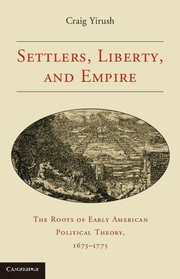2 - The Glorious Revolution in America
Published online by Cambridge University Press: 05 June 2012
Summary
The first British Empire was acquired in a decidedly ad hoc fashion. Beginning in the early sixteenth century, the Crown added to the remnants of its medieval territories several previously independent kingdoms. It acquired Wales and Ireland by conquest, incorporating the former into the realm in 1536, while leaving the latter in a rather ambiguous status somewhere between dependent colony and independent kingdom until the late eighteenth century. The accession of James VI of Scotland to the English throne (as James I) brought Scotland into this loose association of political entities in 1603, although a full political union would not be completed until 1707.
From the early 1600s, the Crown allowed various private interests to establish English colonies on the eastern seaboard of North America, sanctioning these ventures with either a corporate or a proprietorial charter. In the former, a group of individuals who formed a company (as in Massachusetts) received a royal charter (or letters patent). In the latter, the Crown granted the right to settle to a courtier or royal favorite (such as Lord Baltimore in Maryland or William Penn in Pennsylvania). And, beginning with Virginia in the 1620s, the Crown created royal colonies ruled directly by a governor it appointed. Although rare in the seventeenth century – they often resulted from the Crown's revocation of a corporate or proprietary charter – royal colonies became increasingly common in the eighteenth-century empire.
- Type
- Chapter
- Information
- Settlers, Liberty, and EmpireThe Roots of Early American Political Theory, 1675–1775, pp. 51 - 80Publisher: Cambridge University PressPrint publication year: 2011



